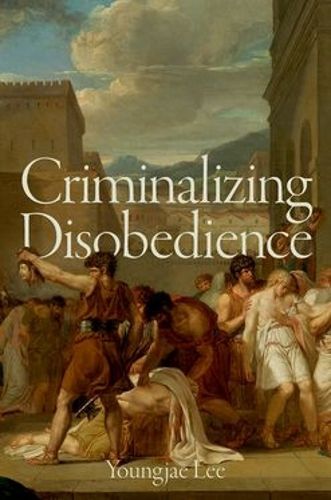Readings Newsletter
Become a Readings Member to make your shopping experience even easier.
Sign in or sign up for free!
You’re not far away from qualifying for FREE standard shipping within Australia
You’ve qualified for FREE standard shipping within Australia
The cart is loading…






Many laws penalize conduct not because it is inherently wrongful, but because the government has prohibited it. Criminalizing Disobedience examines this important yet underexplored aspect of modern criminal law. Such "disobedience offenses" include: administration of justice crimes (contempt, obstruction of justice, perjury); failure-to-assist crimes (hindering prosecution, receiving stolen property, money laundering, failures to register or to report); regulatory offenses (involving, for example, environmental, drug, or medical device laws); preventive offenses (attempt, possession of weapons or drugs); and national security offenses (treason, espionage, export control and sanctions violations). What unifies these otherwise disparate offenses is that their core wrong lies in noncompliance with legal directives - not in unjustifiably harming or endangering others - and the principal reason to refrain from such conduct is simply that the government has said not to do it. By contrast, laws against, say, murder or rape prohibit conduct that is morally wrongful even in the absence of legal prohibition. This book addresses the important normative and conceptual questions these laws raise: How should disobedience be understood? Is it blameworthy to disobey the state? In what ways does the state criminalize and punish disobedience? What should be the limits to the state's power to demand obedience and punish disobedience?
Criminalizing Disobedience explores these questions across a range of legal domains and develops a philosophically sophisticated framework for evaluating such laws - one that, in the process, sheds new light on longstanding questions of political obligation, criminalization, and punishment. It will be of interest to scholars of criminal law, the administrative state, law and philosophy, and political philosophy.
$9.00 standard shipping within Australia
FREE standard shipping within Australia for orders over $100.00
Express & International shipping calculated at checkout
Stock availability can be subject to change without notice. We recommend calling the shop or contacting our online team to check availability of low stock items. Please see our Shopping Online page for more details.
Many laws penalize conduct not because it is inherently wrongful, but because the government has prohibited it. Criminalizing Disobedience examines this important yet underexplored aspect of modern criminal law. Such "disobedience offenses" include: administration of justice crimes (contempt, obstruction of justice, perjury); failure-to-assist crimes (hindering prosecution, receiving stolen property, money laundering, failures to register or to report); regulatory offenses (involving, for example, environmental, drug, or medical device laws); preventive offenses (attempt, possession of weapons or drugs); and national security offenses (treason, espionage, export control and sanctions violations). What unifies these otherwise disparate offenses is that their core wrong lies in noncompliance with legal directives - not in unjustifiably harming or endangering others - and the principal reason to refrain from such conduct is simply that the government has said not to do it. By contrast, laws against, say, murder or rape prohibit conduct that is morally wrongful even in the absence of legal prohibition. This book addresses the important normative and conceptual questions these laws raise: How should disobedience be understood? Is it blameworthy to disobey the state? In what ways does the state criminalize and punish disobedience? What should be the limits to the state's power to demand obedience and punish disobedience?
Criminalizing Disobedience explores these questions across a range of legal domains and develops a philosophically sophisticated framework for evaluating such laws - one that, in the process, sheds new light on longstanding questions of political obligation, criminalization, and punishment. It will be of interest to scholars of criminal law, the administrative state, law and philosophy, and political philosophy.